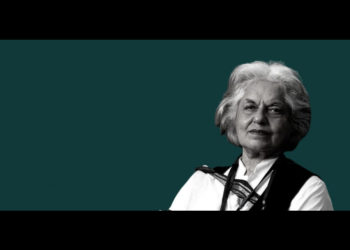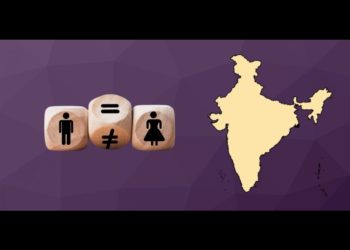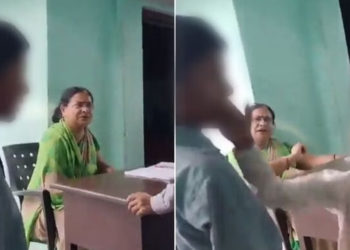Image courtesy AIDWA.
The All India Democratic Women’s Association (AIDWA) will organise a national campaign involving all sections of society to fight the “increasing” violence against women.
At the conclusion of the four-day AIDWA’s 13th national conference in Thiruvananthapuram on Monday, Mariam Dhawale, who was re-elected as general secretary, said, “The youth are being targeted by drug agents, and violence against women is increasing.”
The AIDWA will “organise a national campaign involving all sections of society and reach out to every woman”, she told the media.
During the conference, which started on January 6 with the slogan “Struggle in unity for equality”, 103 members were elected to the AIDWA central executive committee, which comprises a 34-member secretariat.
PK Sreemathi was elected president and S Punyavathi was re-elected treasurer respectively. Out of the 850 delegates, around 110 belonged to Scheduled Castes, 48 Scheduled Tribes and 310 Other Backward Classes.
After a grand inauguration, the delegate session commenced with the general secretary placing two reports on work and organisation, and national and international issues. Over the next two days, delegates from 25 states and Union Territories deliberated on the reports.
They discussed several issues at length such as the growing price rise, destruction of the Public Distribution System, rising unemployment, increasing debt through microfinance institutions and ending of the gas subsidy. The impact of such issues on women and the AIDWA’s role in countering them were highlighted by the delegates.
The rising violence against women with public spaces and nights becoming unsafe was also discussed. The delegates observed that the “menace of drug nexus between the police, politicians, ruling parties and agents” needs to be addressed.
AMENDMENTS & PUBLICATIONS
On the third day of the conference, a historical amendment was made to the AIDWA Constitution by including transwomen as members.
Article 4(c) was amended to include any woman, even transwomen, of 15 years and above as members. They need to conform with AIDWA’s aims and objectives and pay a membership fee of Rs 2.
Two more amendments were adopted pertaining to the nomination of patrons to the district committee and regarding the actions to be taken against those violating the AIDWA Constitution.
The AIDWA released five booklets—An All India Women’s Organisation Takes Shape: Proceedings of the First and the Second Conferences of AIDWA, Gumnam Virangnye (Unknown Women Fighters), Early Struggles for Law Reform: Dowry and Rape, Women Torchbearers of Kerala and a book by MC Josephine—and one diary.
Image courtesy AIDWA.
COMMISSION PAPERS
The AIDWA conference simultaneously deliberated on six commission papers on January 8. The paper on ‘Climate Change and Women’ observed women as the “immediate victims” of climate change and called for urgent intervention.
The paper on ‘National Education Policy, 2020: A Setback for Women’s Struggle for Equality’ laid bare the “patriarchal vision of NEP, which violates the spirit of the Constitution”. It observed that “girl children face the repercussions” of clubbing boys and girls schools and of online education.
The paper on ‘Rights of the Girl Child’ discussed the right to health and education, allocation of separate and adequate budgets for welfare schemes for girls, and strict monitoring of child marriages and girl child trafficking, among others.The fourth paper, ‘The Women’s Movement in India and the Freedom Struggle’, discussed the need to document and assert women’s role in historic struggles given the “fabrication of history by right-wing forces”.
The paper on ‘Women’s Rights and the Question of Unity’ stated in strong terms the urgent need to unite all women against the “imposition of a Manuvadi Hindu Rashtra”.
The sixth paper, ‘Unemployment and Women’, gave special focus to the “deterioration caused by the lockdown and the weakening of MNREGA”.
RESOLUTIONS
The conference in total adopted 13 resolutions, including a resolve to fight the “corporate loot of common property and natural resources” and for the right to work and employment guarantee. It also adopted a resolution to struggle to foster scientific temper and countering superstition.
The conference strongly resolved to fight for deregulating microfinance and drug abuse. The other resolutions included resisting attacks on federalism; protecting the rights of states; stopping targeted attacks against scholars, activists and journalists; revoking the remission of the sentence and expediting justice for victims of the Gujarat riots; taking forward the Kerala model of development; resisting the impact of the erosion of Ganga banks on women and their displacement, and the international refugee crisis.
FRATERNAL GREETINGS
The conference was greeted by DYFI president and MP AA Rahim, All India Agricultural Workers Union president A Vijayaraghavan, All India Kisan Sabha (AIKS) general secretary Vijoo Krishnan and Students’ Federation of India (SFI) general secretary Mayukh Biswas.
Rahim said that Kerala had “provided a Left alternative and women’s resistance was an important part of building such an alternative”.
Vijayaraghavan noted that more than half the membership of AIAWU comprises women and there is a “need to intensify a joint action to build an alternative”.
Krishnan gave the slogan of “Mahila-kisan ekta (Women-farmers unity)” and noted that the Kisan Sabha had taken up many issues related to women farmers, particularly, land rights for landless families.
Image courtesy AIDWA.
Biswas said that women and girl students are “facing several challenges in the wake of the NEP’s implementation”. “The SFI is taking several steps to counter it”, he said hoping that there would be several joint agitations and actions by the Federation and the AIDWA. He ended his speech with the slogan “SFI-AIDWA Zindabad”.
Image credit AIDWA.
The conference concluded with a rally in which around one lakh women participated and a public meeting addressed by chief minister Pinarayi Vijayan.




